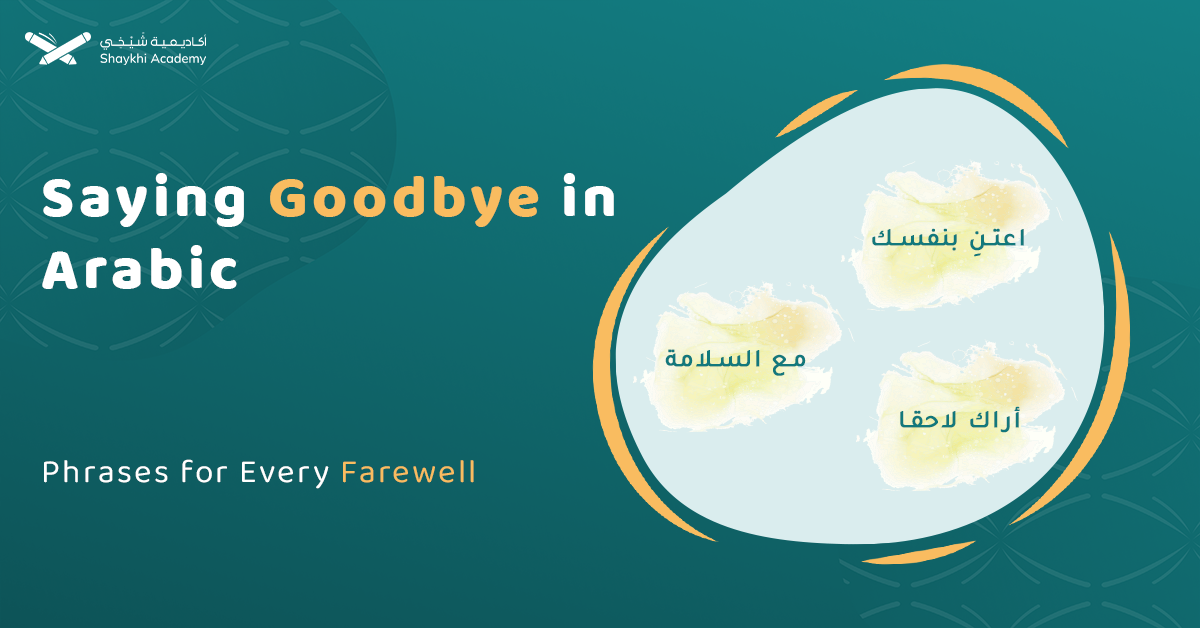Arabic is a language filled with rich expressions and diverse cultural nuances, and saying goodbye is no exception. Depending on the context, the formality of the situation, and the relationship between speakers, there are numerous ways to bid farewell in Arabic.
These phrases carry with them not only linguistic meaning but also cultural depth, reflecting the values of respect, well-wishing, and spiritual connection.
In this article, we explore 10 common ways to say goodbye in Arabic, providing insights into their meanings, uses, and significance.
10 Ways to Say Goodbye in Arabic
Arabic, a language rich in cultural and linguistic diversity, offers various ways to bid farewell depending on the context, level of formality, and personal relationships. To be able to use each word in the correct manner you should learn the Arabic language, which will give you a sense of the linguistic culture and its different aspects.
From casual goodbyes among friends to heartfelt wishes rooted in religious expressions, each phrase carries a unique meaning and tone. Below is a list of 10 common ways to say goodbye in Arabic, complete with their transliteration, meaning, and typical usage, helping you navigate goodbyes with grace in any situation.
| # | Arabic Phrase | Transliteration | Meaning | Usage |
| 1 | مع السلامة | Ma’a as-Salaama | “With peace.” | General and versatile, used in formal and informal settings. |
| 2 | وداعاً | Wadaa’an | “Farewell.” | Formal and poetic, used for significant or long goodbyes. |
| 3 | إلى اللقاء | Ila al-Liqaa | “Until we meet again.” | Friendly, suitable for work or social contexts. |
| 4 | أراك لاحقاً | Araka Lahiqan | “See you later.” | Informal, commonly used among friends. |
| 5 | أراك قريباً | Araka Qareeban | “See you soon.” | Friendly, used when expecting to meet shortly. |
| 6 | في أمان الله | Fi Aman Allah | “In the safety of Allah.” | Religious, heartfelt, commonly used among Muslims. |
| 7 | إلى اللقاء غداً | Ila al-Liqaa Ghadan | “See you tomorrow.” | Casual, specific for planned meetings the next day. |
| 8 | تصبح على خير | Tusbih ‘Ala Khair | “Good night.” | Used at night, often before going to bed. |
| 9 | دمتم بخير | Dumtum Bi Khair | “Stay well.” | Formal, polite, wishing well-being in someone’s absence. |
| 10 | الله معك | Allah Ma’ak | “May Allah be with you.” | Religious, heartfelt, expressing care and protection. |
Here is how to use each of them:
1. مع السلامة (Ma’a as-Salaama) – “With peace.”
This phrase is one of the most commonly used goodbyes in Arabic. It is versatile and can be used in both formal and informal settings. Whether you’re leaving a friend’s house or finishing a business meeting, this expression conveys a wish for peace on the other person’s journey. It’s equivalent to saying “Goodbye” or “Safe travels” in English.
Example:
“أراك غداً، مع السلامة!”
(“See you tomorrow, with peace!”)
“Araka Ghadan, Ma’a as-Salaama”
2. وداعاً (Wadaa’an) – “Farewell.”
“Wadaa’an” is a more formal and poetic way of saying goodbye, often used when bidding farewell for a long period or on significant occasions. This phrase carries a sense of gravity and finality, indicating that the departure might be for an extended time.
Example:
“وداعاً، أتمنى لك كل التوفيق.”
(“Farewell, I wish you all the best.”)
“Wadaa’an, Atamanna laka kul at-tawfiq.”
3. إلى اللقاء (Ila al-Liqaa) – “Until we meet again.”
This phrase is often used in casual and social settings. It expresses the hope of reuniting in the future, making it suitable for both friends and acquaintances. It’s a warm way of saying goodbye without implying a long separation.
Example:
“إلى اللقاء في الأسبوع المقبل!”
(“Until we meet again next week!”)
“Ila al-Liqaa fi al-usbu’ al-muqbil!”
4. أراك لاحقاً (Araka Lahiqan) – “See you later.”
This informal farewell is often used among friends or people you expect to see again soon. It’s casual and friendly, signaling that the separation is temporary.
Example:
“أراك لاحقاً في النادي!”
(“See you later at the club!”)
“Araka Lahiqan fi al-nadi!”
5. أراك قريباً (Araka Qareeban) – “See you soon.”
Similar to “Araka Lahiqan,” this phrase is used when you expect to see the person in the near future. It’s a positive, friendly expression, often used when planning to meet soon after the goodbye.
Example:
“أراك قريباً، استمتع بيومك!”
(“See you soon, enjoy your day!”)
“Araka Qareeban, istamti’ bi-yawmik!”
6. في أمان الله (Fi Aman Allah) – “In the safety of Allah.”
This phrase has a spiritual connotation and is commonly used among Muslims. It reflects a sincere wish for divine protection and safety as the person departs. It’s a warm, heartfelt goodbye that carries religious significance.
Example:
“في أمان الله، ونتمنى لك رحلة سعيدة!”
(“In the safety of Allah, and we wish you a safe journey!”)
“Fi Aman Allah, wa natamanna laka rihla sa’ida!”
7. إلى اللقاء غداً (Ila al-Liqaa Ghadan) – “See you tomorrow.”
This is a casual and specific farewell used when you know you’ll be meeting the person the next day. It’s a practical and friendly way to say goodbye with the expectation of a quick return.
Example:
“إلى اللقاء غداً في العمل!”
(“See you tomorrow at work!”)
“Ila al-Liqaa Ghadan fi al-‘amal!”
8. تصبح على خير (Tusbih ‘Ala Khair) – “Good night.”
Commonly used before going to bed, this phrase is a warm, caring way of wishing someone a peaceful night. It’s informal and usually spoken to close family, friends, or loved ones.
Example:
“تصبح على خير، أحلام سعيدة!”
(“Good night, sweet dreams!”)
“Tusbih ‘Ala Khair, ahlam sa’ida!”
9. دمتم بخير (Dumtum Bi Khair) – “Stay well.”
This polite, formal phrase expresses a wish for the other person’s well-being in their absence. It’s a respectful and positive way of saying goodbye, often used in professional or polite settings.
Example:
“دمتم بخير، إلى اللقاء!”
(“Stay well, until we meet again!”)
“Dumtum Bi Khair, Ila al-Liqaa!”
10. الله معك (Allah Ma’ak) – “May Allah be with you.”
This religious phrase expresses care and protection, invoking Allah’s blessings upon the person leaving. It’s heartfelt and is commonly used among Muslims, especially when the departure is for travel or a significant journey.
Example:
“الله معك، احترس في طريقك!”
(“May Allah be with you, take care on your way!”)
“Allah Ma’ak, ihtaris fi tareeqik!”
Read more about: 10 Ways to Say Thank You in Arabic
The Importance of Saying Goodbye in Arabic
Saying goodbye in Arabic goes beyond simple words; it reflects the cultural values, religious sentiments, and social etiquette of Arabic-speaking societies. Below are the key aspects of its importance, divided into sections for clarity.
1- A Reflection of Respect and Connection
Goodbyes in Arabic are a way to show respect and maintain social bonds. Whether formal or informal, they convey consideration and thoughtfulness, leaving the other person with a sense of dignity and warmth. This respect strengthens relationships and promotes mutual understanding.
2- Rooted in Cultural and Religious Values
Many Arabic farewell phrases are tied to Islamic traditions, incorporating blessings or mentions of peace and divine protection. For example, expressions like “في أمان الله” (Fi Aman Allah) and “الله معك” (Allah Ma’ak) highlight the cultural emphasis on safety and spirituality. To learn the religious expressions, it is recommended to join a classical Arabic course, where the tutor would focus on classical Arabic and its religious contexts.
3- An Expression of Well-Wishing
Arabic goodbyes often include wishes for well-being, such as “دمتم بخير” (Dumtum Bi Khair), meaning “Stay well.” These expressions not only close conversations but also leave the other person with positive and uplifting sentiments.
4- Facilitating Positive Impressions
Knowing how to say goodbye in Arabic appropriately demonstrates cultural awareness and politeness, especially when interacting with native speakers. It helps build rapport, fosters goodwill, and creates a lasting positive impression in both personal and professional settings.
5- Strengthening Social Bonds
Farewells in Arabic are not merely transactional but serve as a way to reinforce relationships. Whether with friends, family, or colleagues, saying goodbye thoughtfully fosters a deeper connection and reflects a sense of belonging.
Mastering Arabic goodbyes is not only a linguistic skill but also a cultural practice that enhances your interactions and leaves a meaningful impact on those you meet.
Start Your Journey to Mastering Fusha Arabic Today!
Ready to learn Arabic Fusha and speak with confidence? Our Learn to Speak Arabic Fusha course at Shaykhi Academy is designed for learners of all levels, offering comprehensive lessons and practical skills. Whether you’re a beginner or looking to refine your language abilities, this course provides expert guidance and a flexible learning environment.
Don’t wait – enroll today and begin speaking Arabic Fusha with clarity and fluency! Start Learning Now
Why Shaykhi Academy?
- Expert Native Tutors: Learn from highly qualified native Arabic speakers.
- Flexible Scheduling: Tailor your classes to fit your busy life.
- Affordable Learning: Access top-quality education at a price that suits you.
- Global Access: Study from anywhere in the world.
Explore Our Arabic Courses:
- Noorani Qaida: Build a strong foundation in Quranic Arabic.
- Comprehensive Arabic Courses: Master the Arabic language, from beginner to advanced levels.
- Fusha Arabic Classes: Delve into Modern Standard Arabic, the key to understanding literature, media, and formal communication across the Arab world.
- Quranic Arabic Course: Enhance your connection with the Quran by learning the language in which it was revealed.
Start Your Arabic Journey Today! Whether you’re just starting or looking to deepen your knowledge, Shaykhi Academy is here to support your journey. Book your free trial now and begin your path to Arabic mastery!

The Conclusion:
Mastering the various ways to say goodbye in Arabic is an essential part of understanding the language’s social and cultural fabric. Each farewell phrase is a reflection of the respect, care, and positive intentions that form the foundation of relationships in Arabic-speaking cultures.
By learning these expressions, you not only enhance your linguistic skills but also connect with others in a deeper, more meaningful way. Whether you’re engaging in casual conversation or expressing heartfelt sentiments, these goodbyes help you leave a lasting, positive impression.

















































